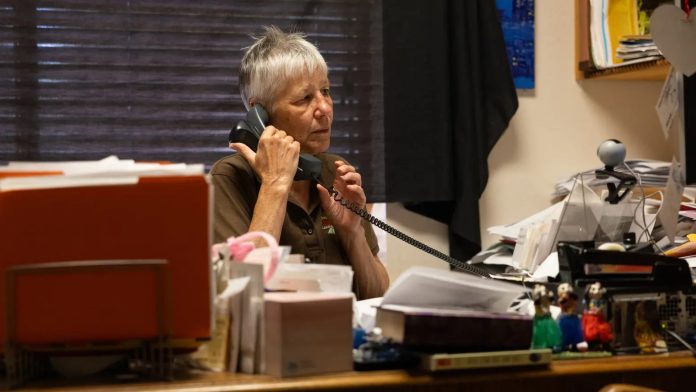
By Stephen Simpson, The Texas Tribune
SMITHVILLE When the COVID-19 pandemic first shut down the Smithville Public Library, it was as if a vital community artery had been severed.
“We did see a lot of anxiety when people felt cut off from reading materials,” recalled Judith Bergeron, the library’s director. “Some of that anxiety led to anger directed at library staff, so it was important to us to try to provide whatever services we could remotely.”
But for Bergeron, libraries – especially in small Texas towns like Smithville – are more than a book lending depot. In 2018, she recognized a need for mental health services in this 4,000-person town 45 miles east of Austin, and she set up a “Coffee with a Counselor” program allowing patrons who need to, a private study room to meet with a mental health professional over coffee.
The pandemic, however, ushered in a whole next level of isolation. The business shutdowns had left residents here without their nerve center, the public library. And that’s when Bergeron hatched a new plan. She created five different book clubs for her more marginalized neighbors: military veterans, people of color, teenagers, Spanish speakers and members of the LGBTQ+ community. With the help of a $15,000 grant from the St. David’s Foundation, the program proved successful.
The book clubs were such a hit in conservative Bastrop County, some of the participants joined the library’s general monthly book club, and the LGBTQ+ book club still meets monthly.
“I had one of them tell me this is the one place they feel safe and comfortable in, and isn’t that the definition of what the library is meant to be? A place to feel safe,” Bergeron said.
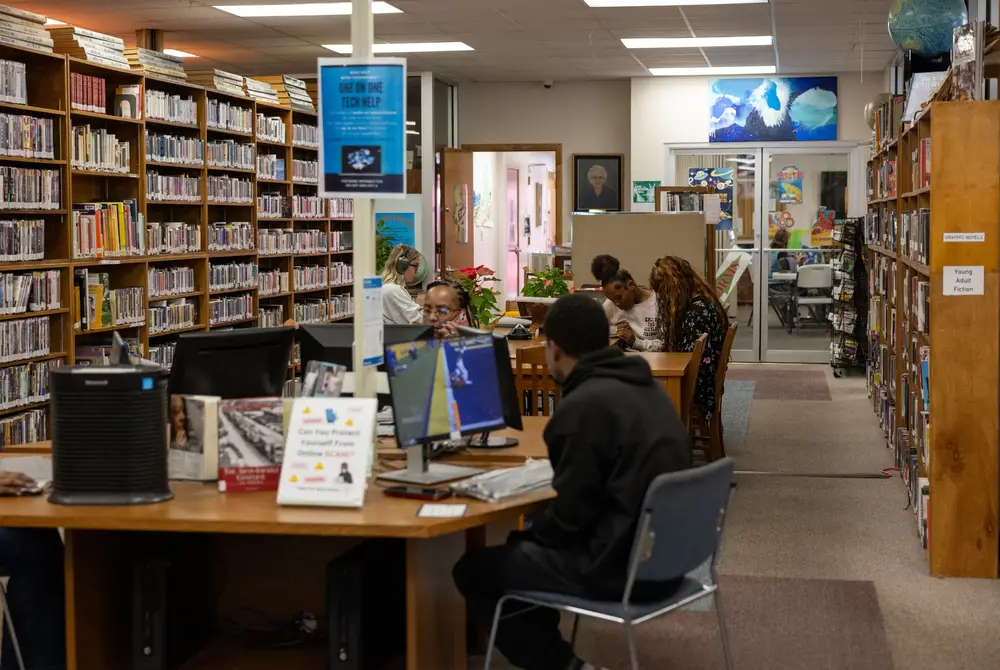
Bergeron and her efforts in Smithville are part of a growing effort among libraries to put more mental health care resources into their community.
From the Texas State Library and Archives Commission in Austin offering a mental health resources page to the San Antonio Public Library’s mental health awareness presentation on the signs of anxiety to a private telehealth room where patrons can meet with a counselor via Zoom in North Texas town of Pottsboro, these librarians do their best to help their communities with mental health resources.
The National Library of Medicine’s South Central Region gave the Pottsboro Area Library a $20,000 COVID-19 outreach grant to develop programs to improve health literacy and information access related to the pandemic. In 2021, the American Library Association awarded the Hewitt Public Library a $3,000 grant to create community conversations about mental health.
And more recently, the St. David Foundation, a grantmaking organization for Central Texas, and its partners, Via Hope, a mental health nonprofit, and RAND, a research organization, allocated $1.5 million to eight Central Texas libraries as part of a three-year pilot program that will end in December.
Abena Asante, senior program officer at St. David’s Foundation, said their team developed the Libraries for Health Initiative after they hosted several community conversations in which mental health needs continuously came to the forefront of discussion.
“We chose libraries because they are open to the public and trusted by people of all demographics. We wanted to take advantage of that, put libraries in the driver’s seat, and work with them to create a health initiative,” she said.
The pilot program is designed to allow mental health programs to flow seamlessly into the library’s community service model. The peer specialist training program provided the initial training for certification using a federal grant from the Health Resources and Services Administration.
Asante said one of the things that struck her when their library program was launched was the number of librarians who knew what mental health services were working in their community and which ones were not.
“They knew things way before the city or the county or other nonprofit organizations because the library is such a trusted entity that people will come and tell them about everything. So, when we announced this program, all these libraries were excited to have a response to something they have seen all this time but didn’t have the confidence to address it,” she said.
This new resources have allowed rural libraries to pitch in and help address the growing mental health need in their communities.
Texas is a state where 98 percent of its 254 counties are designated as Mental Health Professional Shortage Areas, areas where there’s only 1 clinician for 30,000 residents, and the state’s behavioral health worker shortage is expected to grow.
This workforce shortage has prevented private and state-run mental health hospitals from operating at total capacity, created long waitlists for therapy services, and forced many private providers from taking on new clients as the demand has exceeded scheduling capacity.
According to a 2023 state progress report to the Legislature, there are 5,031 licensed psychologists available in the state. But only 111 counties – less than half of the state’s 254 counties – have one, and only 83 counties have a psychiatrist.
Meanwhile, suicide in rural communities is rising. In 2022, Texas Health and Human Services released a report examining 21 years’ worth of data and found that the suicide rate in non-metro areas has increased by 55.3% during this period, from 12.3 deaths per 100,000 population to 19.1 deaths per 100,000 population. The suicide rate in metro areas isn’t much better, as it has increased by 35.1% over this same time frame, going from 9.4 deaths per 100,000 population to 12.7 deaths.
In 2019 in Texas, 14% of the state’s 3,891 suicides occurred in rural areas, though only accounting for 11% of Texas residents.
The Smithville library director has witnessed this firsthand as she had a woman come in last year to explain her movie return was late because her best friend killed himself in front of her.
“She looked shaken up and just told me I need some help, but I don’t know where to go,” the woman told Bergeron she said.
Why libraries?
In late 2021, Brittany Flores was in the midst of a four-month job search. The Smithville resident had quit her previous position as a certified parent educator for families who might be going through a crisis or as a needed course in a divorce settlement when she realized she could no longer take care of her son’s mental health needs and focus on her own as a victim of domestic violence in that position.
“I tried to take an extended leave, but they wouldn’t let me, so I left,” Flores said. ‘But I knew I still wanted to help people.”
That’s when Flores learned of a peer-support specialist job with the St. David’s Foundation As a peer support specialist, Flores would be taking their own lived experience and using it to help others find mental health help, a sort of professional mentor.
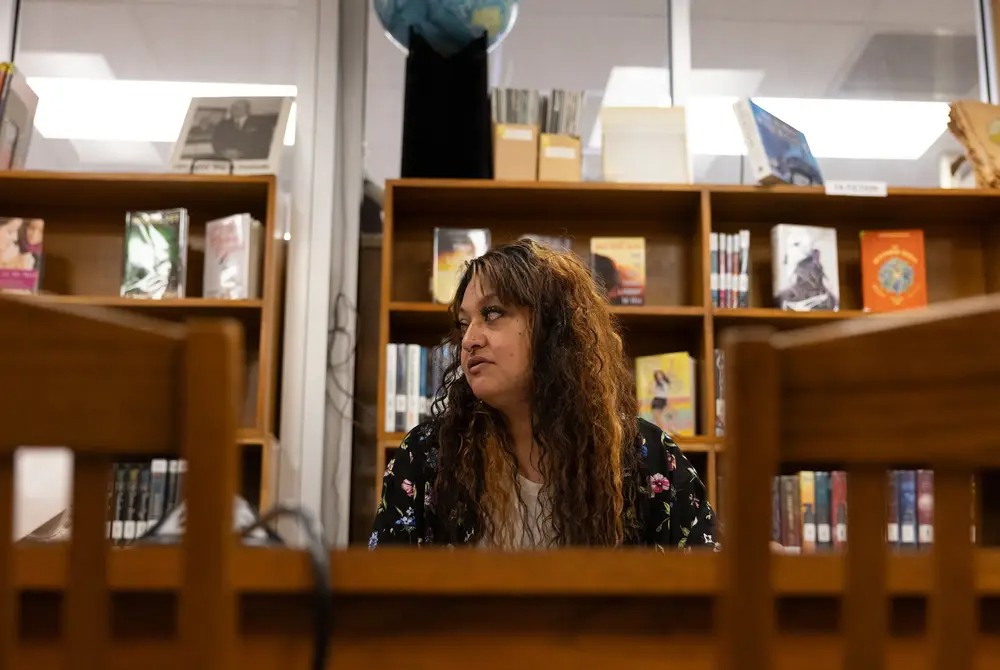
But when Flores learned at the start of 2022 that she was being assigned to work in her town’s library, she was slightly confused. What did her new job have to do with a rural public library?
“To be honest, I had never stepped foot into a library before this job because, to me, it was always just a place for books,” she said.
In her first weeks on the job, library staff pointed out to her a homeless teenage girl found sleeping at one of the library’s tables.
“They asked me to talk to her, and when I approached her, I just asked if she was all right and if she wanted to get something to eat,” Flores said. “That was the start of our relationship.”
Jalen, 18, asked The Texas Tribune not to publish her last name. Originally from Houston, Jalen said her various conflicts with family had led her to friends in Smithville. But without stable housing, she drifted between a friend’s home and living on the streets for a few years.
She had turned to the library as a place to rest. She said that’s where she met Flores, who has helped her acquire the resources she needed to find a place to stay, helped her with employment, and motivated her to continue going through life despite the challenges she might face.
“I just felt like I didn’t have any other way out. I was literally at the bottom of my life,” Jalen told the Tribune through an emailed statement, recalling how she first met Flores. “And then she showed up like, tada, you still have a chance.”
Peer support specialists must highlight to their clients that there is no defined set of tasks or one road to recovery and wellness.
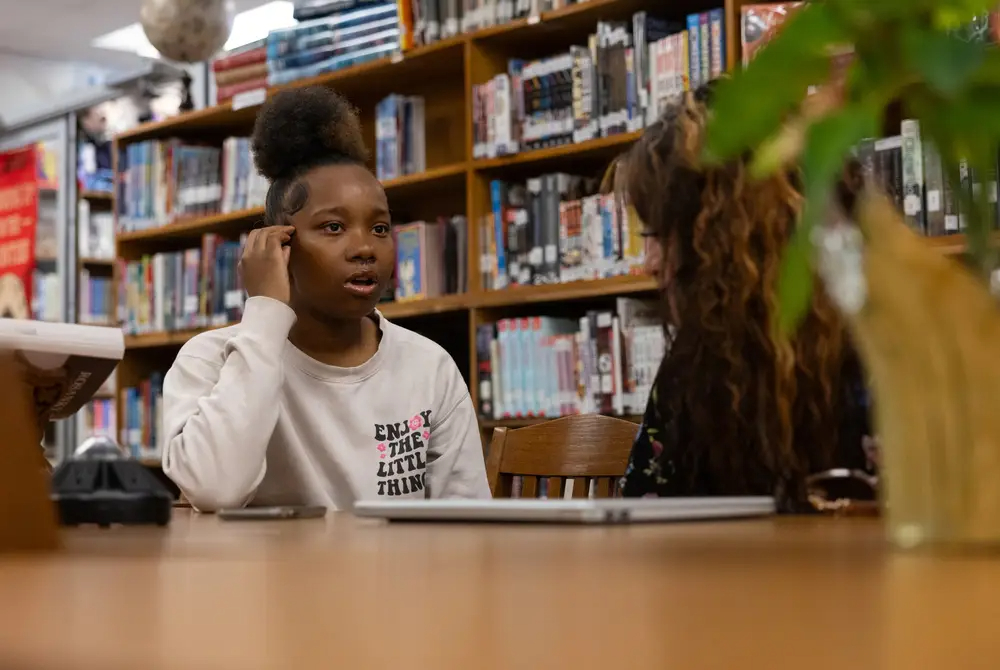
“I don’t tell anyone to do anything. I just tell my story and listen. I always ask them what they would do in my situation, which gives me insight into what they may be going through. Sometimes, someone just needs somebody to talk to,” Flores said.
When Smithville resident Donella McLean saw Flores working with people in the library, she became curious about her role.
McLean herself had been living with bipolar and post-traumatic stress disorder while raising her daughter alone.
“People tend to gravitate towards the library because it’s free, and a lot of mentally unstable people have limited funds. They naturally go somewhere where it’s not going to cost them anything,” McLean said. “I always thought to myself they need a mental health worker here because just having someone to talk to helped me so much.”
Now, McLean is in peer support training, and once completed, she hopes to be assigned to another Central Texas library to do what Flores is doing in Smithville.
“I think I always wanted to be a peer support specialist. But I never had the means to do it until now,” McLean said. “I know that you can survive (mental illness). I feel that I’m a success story in many ways, and because of that, I feel called to share that with others.”
The community anchor
For years, Bergeron has kept a heart-shaped locket on her keys to remind herself to take care of her mental health. When Flores began working at the library, Bergeron decided she needed to do more and started making hand-made clay pocket hearts available to everyone who walked into the library.
Late last year, a woman came into the library to return some books when she noticed the hearts and asked about them. When Bergeron told her they’d become a gentle reminder for patrons to think about their mental health, the woman told Bergeron how the library had been an essential part of her cancer treatments.
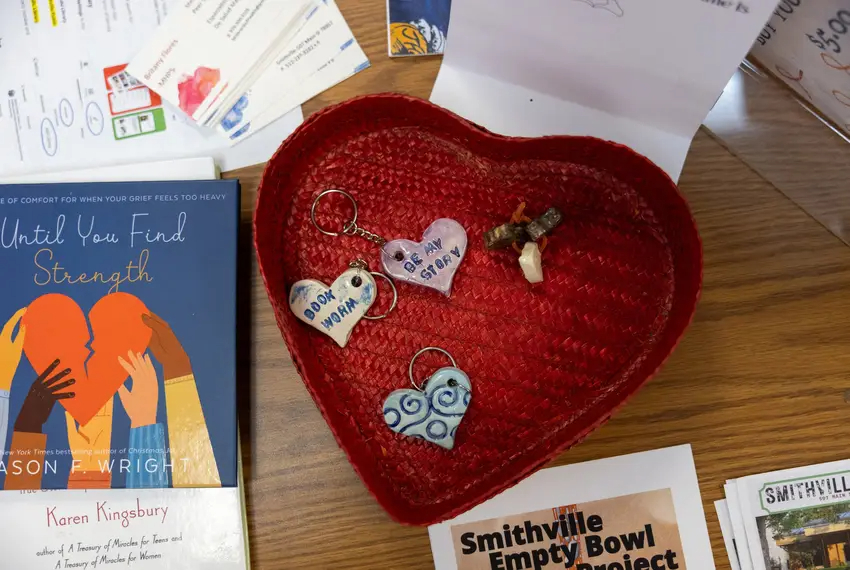
“Every time she goes in for treatment, she goes to the library to get some books because she knows she will be sitting for a long time. She said we felt like part of her recovery team and started to cry when I gave her the heart,” Bergeron said. “She now has her chemo group helping make pocket hearts for the library.”
Elsewhere in Texas, libraries are finding more ways to help their patrons stay healthier.
South of Waco, the Hewitt Public Library has tapped American Library Association funds to create mental health kits, including stress balls and fidget spinners. In far North Texas, the Pottsboro Public Library, located near the Oklahoma border, used funds from the National Library of Medicine’s South Central Region to create a telehealth room for physical and mental health appointments.
“Rural libraries are different from suburban and urban libraries because many resources are already available in their community, so a library doesn’t need to do it. But in our community, if the library doesn’t do it, it won’t happen,” said Dianne Connery, Pottsboro’s librarian.
Lawmakers have attempted to address the mental health workforce problem in non-metro areas since 70% of Texas counties are rural by incentivizing mental health providers to practice in remote areas and expanding telehealth. However, this is a long-term measure and won’t fix the crisis in the short term.
To address this need, libraries have started to get creative with the resources available to them to continue their role as community centers where people can go and find resources on housing, employment, substance abuse services, and mental health.
Ree Kogun, a 65-year-old man who moved to Pottsboro six years ago, said he picked up a telehealth flyer at his local pharmacy in 2022 mentioning the library’s physical and mental health services. He has used the services ever since.
“I have a Walmart smartphone with a $25 monthly plan as my only internet access. At the library, they offer a large monitor and a very good connection to the internet. It is much better than doing my appointments on a small screen,” he said.
After Kogun began using the room for his medical telehealth appointments, he realized he needed a therapist for the stress and anxiousness he was dealing with after the COVID-19 pandemic because it was causing his blood pressure to spike.
“There are limited resources in Pottsboro, and the library offered me a chance to get better care from different doctors and therapists. My stress levels are lower, and so is my blood pressure,” he said.
For 24/7 mental health support in English or Spanish, call the Substance Abuse and Mental Health Services Administration’s free help line at 800-662-4357. You can also reach a trained crisis counselor through the Suicide and Crisis Lifeline by calling or texting 988.
Disclosure: St. David’s Foundation is a financial supporter of The Texas Tribune, a nonprofit, nonpartisan news organization that is funded in part by donations from members, foundations and corporate sponsors. Financial supporters play no role in the Tribune’s journalism. Find a complete list of them here.
This article originally appeared in The Texas Tribune at https://www.texastribune.org/2024/03/22/texas-libraries-mental-health/.
The Texas Tribune is a member-supported, nonpartisan newsroom informing and engaging Texans on state politics and policy. Learn more at texastribune.org.



